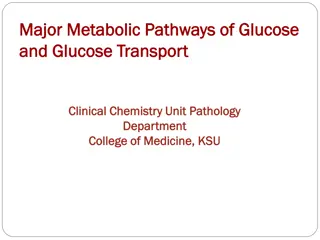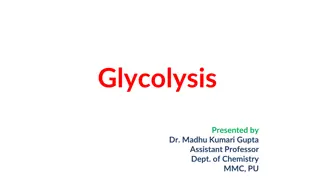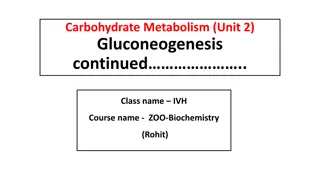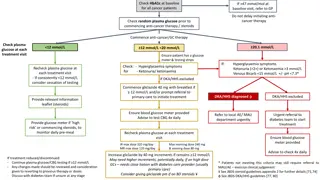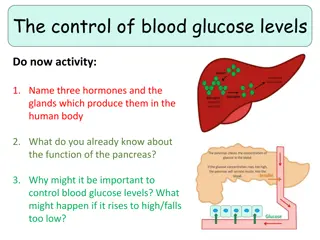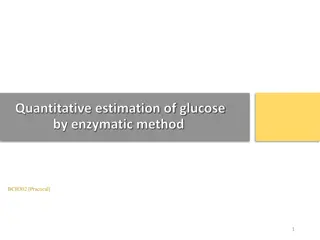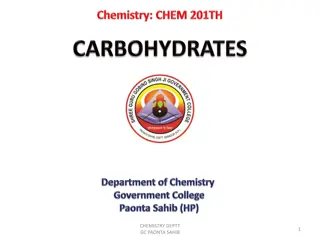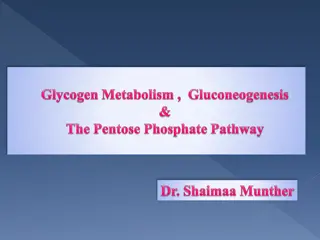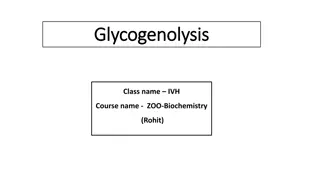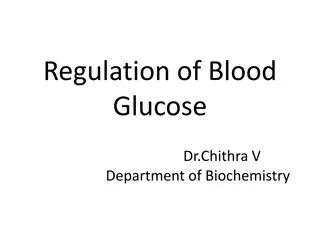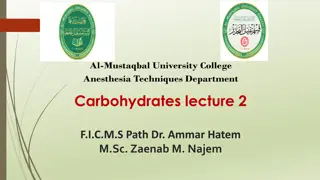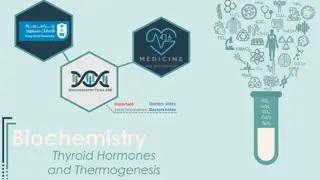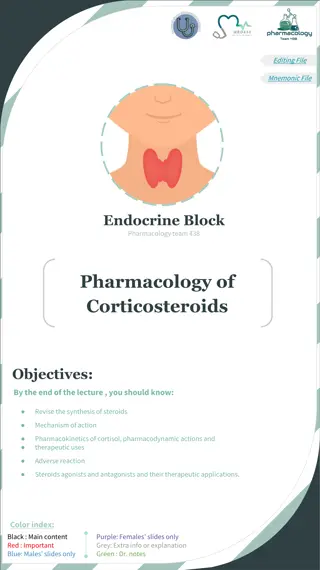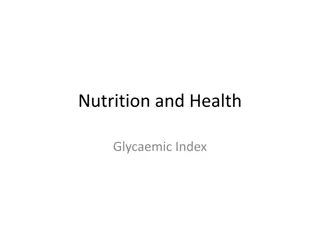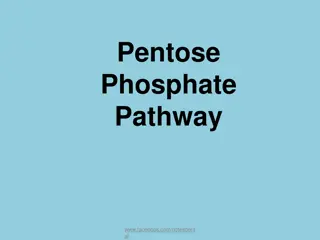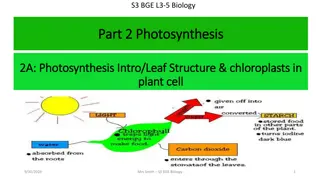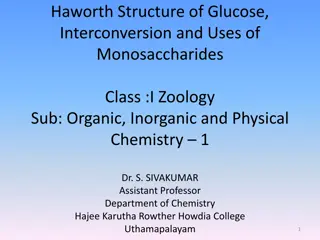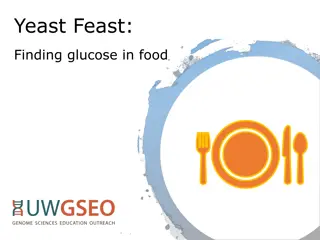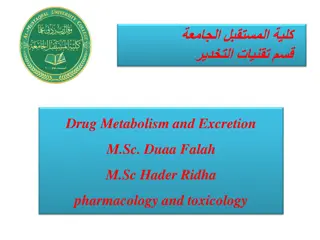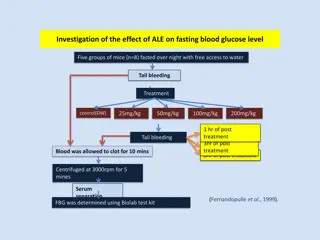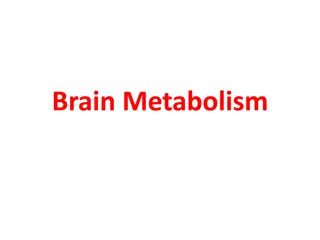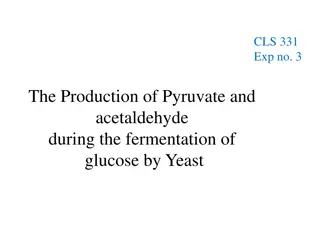Glucose Metabolism: Importance of Gluconeogenesis Pathway
Glucose metabolism involves the vital process of gluconeogenesis for glucose production. Explore the main reactions, rate-limiting enzymes, and energy consumption of this pathway in the liver and kidneys. Understand the substrates, including glycerol, lactate, pyruvate, and gluconeogenic amino acids, that contribute to glucose production. Dive into the gluconeogenic pathway steps, dephosphorylation, carboxylation, and key enzymes, such as glycerol kinase. Uncover the role of glucogenic amino acids and how substrates like lactate and various amino acids support gluconeogenesis.
Download Presentation

Please find below an Image/Link to download the presentation.
The content on the website is provided AS IS for your information and personal use only. It may not be sold, licensed, or shared on other websites without obtaining consent from the author.If you encounter any issues during the download, it is possible that the publisher has removed the file from their server.
You are allowed to download the files provided on this website for personal or commercial use, subject to the condition that they are used lawfully. All files are the property of their respective owners.
The content on the website is provided AS IS for your information and personal use only. It may not be sold, licensed, or shared on other websites without obtaining consent from the author.
E N D
Presentation Transcript
Glucose Metabolism: Glucose Metabolism: Gluconeogenesis Gluconeogenesis By Amr Amr S. S. Moustafa Moustafa, , MD, PhD Assistant Prof. & Consultant, Medical Biochemistry Assistant Prof. & Consultant, Medical Biochemistry Unit, Pathology Dept., College Pathology Dept., College of Medicine, KSU amrsm@ksu.edu.sa amrsm@ksu.edu.sa MD, PhD Unit, of Medicine, KSU
Objectives Objectives The importance of gluconeogenesis as an important pathway for glucose production The main reactions of gluconeogenesis The rate-limiting enzymes of gluconeogenesis Gluconeogensis is an energy-consuming, anabolic pathway
Gluconeogenesis: An Overview Gluconeogenesis: An Overview Liver (mainly) and Kidneys Both mitochondria and Cytosol Exception: Glycerol, only cytosol Gluconeogenic substrates: Glycerol Lactate and Pyruvate Glucogenic amino acids
Gluconeogenic Gluconeogenic Pathway Pathway 4. Dephosphorylation of G6P 3. Dephosphorylation of F1,6P 2. Transport of OA 1. Carboxylation of pyruvate
Gluconeogenic Gluconeogenic Substrates: Glycerol Glycerol Substrates: *GK Glycerol Glycerol 3-phosphate ATP ADP NAD+ Glycerol 3-phosphate dehydrogenase NADH Glucose Dihydroxyacetone phosphate *GK: Glycerol kinase only in liver & kidneys
Glucogenic Amino Acids Glucogenic Amino Acids Aspartate (Asp) Asparagine (Asn) Glutamate (Glu) Glutamine (Gln) Phenylalanine (Phe) Tyrosine (Tyr) Methionine (Met) Valine (Val)
Gluconeogenic Gluconeogenic Substrates Substrates Lactate Amino acids Pyruvate Alanine (Ala) Glycine (Gly) Aspartate (Asp) Asparagine (Asn) Glutamate (Glu) Glutamine (Gln) Phenylalanine (Phe) Tyrosine (Tyr) Methionine (Met) Valine (Val)
Gluconeogenic Gluconeogenic Substrates: Lactate Substrates: Lactate (Cori Cycle) (Cori Cycle)
Gluconeogenic Gluconeogenic Pathway Pathway Dephosphorylation of G-6-P Dephosphorylation of F 1,6-P Transport of OAA Carboxylation of pyruvate
Carboxylation Carboxylation of the Mitochondria the Mitochondria of Pyruvate Pyruvate in in Pyruvate Carboxylase Biotin Pyruvate Oxaloacetate ATPADP + Pi CO2
Regulation of Regulation of Pyruvate Pyruvate Carboxylase Carboxylase Acetyl CoA diverts pyruvate away from oxidation and toward gluconeogenesis
Pruvate Carboxylase and PEP Pruvate Carboxylase and PEP- -CK CK Fasting: Acetyl CoA (From FAO)* *Fatty Acid Oxidation Pyruvate carboxylase + PEP-CK = Pyruvate kinase
Fructose 1,6 Fructose 1,6- -Bisphosphatase Bisphosphatase Fructose 1,6-bisphosphatase = PFK-1
Glucose 6 Glucose 6- -Phosphatase Phosphatase Glucose 6-phosphatase = Glucokinase
Gluconeogensis: Gluconeogensis: E E- - Consumed Consumed Six High-Energy Phosphate Bonds Are Consumed for the Conversion of Pyruvate to Glucose
Gluconeogenesis: Regulation Gluconeogenesis: Regulation Reciprocal control of Gluconeogenesis & Glycolysis Allosteric regulation: Acetyl CoA Pyruvate carboxylase AMP or ATP F 2,6-Bisphosphate Glucagon ( I/G ratio) Allosteric ( F 2,6-Bisphosphate) Induction (PEP-CK) + - + F 1,6-bisphosphatase -
Take Home Message Take Home Message Gluconeogenesis: Synthesis of glucose from noncarbohydrates Anabolic Energy-consuming Four unique enzymes are required for reversal of the 3 irreversible reactions of glycolysis Both gluconeogenesis & glycolysis are reciprocally-regulated


